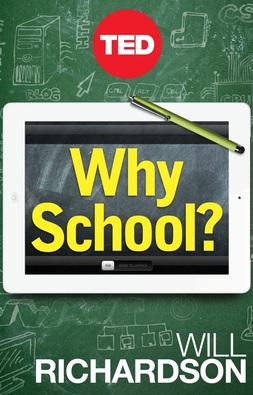"A veteran teacher turned coach shadows 2 students for 2 days – a sobering lesson learned"
I have read this article before, and I remember when I read it the first time, I just nodded. As I read it the second time, even with knowing what was coming, I nodded. I remember my high school experience being extremely similar; I would show up, listen to lecture, take notes, sit (and sit), and keep my head down so that I would not be noticed. - I cannot say if the school that I am at is similar to the article, because I have only experienced a few classrooms.
SPEAK - Within my main classroom, I try to make sure that my students have opportunities to speak (although 98% of them don’t unless I use the random name system). This is so troubling to me, because I know students have thoughts and opinions, but something has hindered them from sharing. I was one of those kids.. I kept my head down, even if I had something valuable to contribute due to fear of being reprimanded for a wrong answer by my peers or teacher. When my kids DO decide that they want to say something, I make sure that I give a positive response, no matter what (THANK YOU! AWESOME! GREAT THOUGHT! I APPRECIATE YOUR PARTICIPATION!). The positive reinforcement shows the students that I CARE and that I WANT TO HEAR what they have to say. FEELING heard is extremely important.
I also try and let my students work in groups as much as possible. Of course, there is time for individual work, but teenages are social beings. Understanding that is crucial! Classrooms need to be filled with the voices of many, not the voice of one.
MOVE IT - Kids are forced to sit all throughout the day, and I completely agree that sitting is exhausting! The classes that I have now are 55 minutes, so I can see some issues arising with getting kids to move around. Getting them into groups is one way to do so for a brief period of time, but that can also waste valuable time (sometimes it takes 10 minutes+ to get them into groups and calmed down enough to actually work). In a school with a block day, I think I would try to incorporate more movement, in the form of stretching (like the article suggested) or an activity involving movement.
"Redefining Teachers with a 21st Century Education ‘Story’"
“and today as under-empowered participants in a stagnant system designed to broadcast standardized information.” This quote is speaking about teachers today! OUCH!
Sadly, I do agree with the author’s portrayal of schools today. I feel that schools are so concerned about ranking in regards to standardized tests, that what truly matters is lost. Schools should be STUDENT centered, focusing on what the students will need to be successful outside of the classroom. In order to do that, the author offers some “remedies” to help with creating schools that focus on the futures of students.
Appreciate the power, beauty, and challenge of the present moment.
In this section, it talks about teachers being GRATEFUL. Be grateful for the opportunity that you have to influence the lives of the future generations! Grateful people make for HAPPY people. Bring joy into the classroom = creating a successful classroom.
Contribute to a global vision
Classrooms should not be totally, 100% focused on standardized tests. Focusing on testing is not going to help students in the future - after reading so many articles stating that companies are not looking at what the future employees KNOW, but what they can DO with what they know. Don’t teach students to the test, teach them towards life OUTSIDE of the four walls.
Redefine smart
Smart is no longer about WHAT you know. It’s about what you can DO with what you know. Students should be learning to express themselves positively, be empathetic, be curious, be open, and be critical thinkers.
Live the collaborative reality
Let’s face it. Information is everywhere, and people had to produce the information in some way. Collaboration is literally everywhere. We should be teaching our students how to work together and share their discoveries. Companies want their employees to work together, so why shouldn’t we be teaching this as early as we can?
I have read this article before, and I remember when I read it the first time, I just nodded. As I read it the second time, even with knowing what was coming, I nodded. I remember my high school experience being extremely similar; I would show up, listen to lecture, take notes, sit (and sit), and keep my head down so that I would not be noticed. - I cannot say if the school that I am at is similar to the article, because I have only experienced a few classrooms.
SPEAK - Within my main classroom, I try to make sure that my students have opportunities to speak (although 98% of them don’t unless I use the random name system). This is so troubling to me, because I know students have thoughts and opinions, but something has hindered them from sharing. I was one of those kids.. I kept my head down, even if I had something valuable to contribute due to fear of being reprimanded for a wrong answer by my peers or teacher. When my kids DO decide that they want to say something, I make sure that I give a positive response, no matter what (THANK YOU! AWESOME! GREAT THOUGHT! I APPRECIATE YOUR PARTICIPATION!). The positive reinforcement shows the students that I CARE and that I WANT TO HEAR what they have to say. FEELING heard is extremely important.
I also try and let my students work in groups as much as possible. Of course, there is time for individual work, but teenages are social beings. Understanding that is crucial! Classrooms need to be filled with the voices of many, not the voice of one.
MOVE IT - Kids are forced to sit all throughout the day, and I completely agree that sitting is exhausting! The classes that I have now are 55 minutes, so I can see some issues arising with getting kids to move around. Getting them into groups is one way to do so for a brief period of time, but that can also waste valuable time (sometimes it takes 10 minutes+ to get them into groups and calmed down enough to actually work). In a school with a block day, I think I would try to incorporate more movement, in the form of stretching (like the article suggested) or an activity involving movement.
"Redefining Teachers with a 21st Century Education ‘Story’"
“and today as under-empowered participants in a stagnant system designed to broadcast standardized information.” This quote is speaking about teachers today! OUCH!
Sadly, I do agree with the author’s portrayal of schools today. I feel that schools are so concerned about ranking in regards to standardized tests, that what truly matters is lost. Schools should be STUDENT centered, focusing on what the students will need to be successful outside of the classroom. In order to do that, the author offers some “remedies” to help with creating schools that focus on the futures of students.
Appreciate the power, beauty, and challenge of the present moment.
In this section, it talks about teachers being GRATEFUL. Be grateful for the opportunity that you have to influence the lives of the future generations! Grateful people make for HAPPY people. Bring joy into the classroom = creating a successful classroom.
Contribute to a global vision
Classrooms should not be totally, 100% focused on standardized tests. Focusing on testing is not going to help students in the future - after reading so many articles stating that companies are not looking at what the future employees KNOW, but what they can DO with what they know. Don’t teach students to the test, teach them towards life OUTSIDE of the four walls.
Redefine smart
Smart is no longer about WHAT you know. It’s about what you can DO with what you know. Students should be learning to express themselves positively, be empathetic, be curious, be open, and be critical thinkers.
Live the collaborative reality
Let’s face it. Information is everywhere, and people had to produce the information in some way. Collaboration is literally everywhere. We should be teaching our students how to work together and share their discoveries. Companies want their employees to work together, so why shouldn’t we be teaching this as early as we can?


